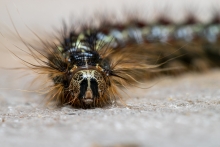You are here
Study: For Trees, Carbs Are Key to Surviving Insect Defoliation

A study published today in Functional Ecology by HF Senior Ecologist Audrey Barker Plotkin and colleagues sheds light on why some oak trees in our region survived a recent severe outbreak of invasive moth, and some did not. The key? Carbohydrates.
The new study reveals the specific threshold of reserves necessary for the trees to survive: 1.5 percent carbohydrates in their dried wood– or about 20-25% of their normal storage capacity.
The repeated emergence of Lymantria dispar (an insect formerly known as "gypsy moth") from 2016 to 2018 challenged trees' resilience by defoliating them year after year.
Co-authors on the study include Meghan Blumstein, NSF Post-doctoral Research Fellow at MIT (and former Harvard Forest research assistant and OEB PhD student), HF Research Assistant Danelle Laflower, HF Senior Ecologist Jonathan Thompson, Research Scientist Valerie Pasquarella of Boston University, and Jennifer Chandler and Joseph Elkinton from the University of Massachusetts.
- Read a blog post about the study, written by lead author Audrey Barker Plotkin.
- Explore a local NPR feature on the study: Research Explains Why Some Oak Trees Are More Resilient After Caterpillars Feast
- Read the full press release.
- Explore the full text of the study in Functional Ecology: Defoliated trees die below a critical threshold of stored carbon
(Photo of Lymantria dispar caterpillar, by Nathan Oalican.)

